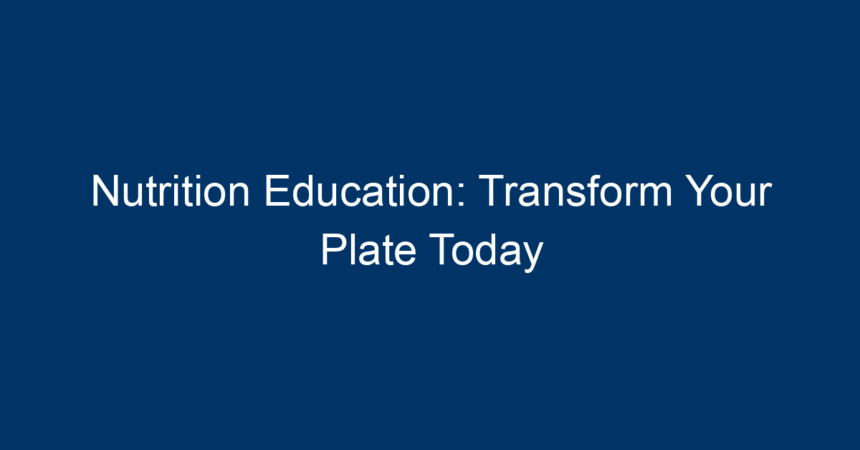In today’s fast-paced world, making informed food choices is more critical than ever. With the rise of processed foods and misleading nutritional labels, consumers are often left confused about what constitutes a healthy diet. Enter nutrition education: an essential tool that empowers individuals to transform their plates and enhance their overall well-being. In this article, we will explore the importance of nutrition education, its benefits, and practical steps you can take today to improve your dietary habits.
Understanding Nutrition Education
What is Nutrition Education?
Nutrition education is an essential aspect of public health that focuses on imparting knowledge about the principles of healthy eating. It encompasses understanding macronutrients and micronutrients, the food groups, portion control, and the impact of diet on overall health. Through effective nutrition education, individuals can make informed choices that support their health goals, whether that’s weight loss, improved energy levels, or disease prevention.
Why is it Important?
Understanding nutrition goes beyond calorie counting; it involves recognizing how different foods impact our bodies. Proper nutrition education can help combat chronic diseases such as obesity, diabetes, and heart disease. Furthermore, it promotes overall well-being by teaching people how to enjoy a balanced diet, leading to better mental health and improved quality of life.
The Benefits of Nutrition Education
1. Enhanced Nutritional Knowledge
A well-rounded nutrition education provides individuals with a comprehensive understanding of the types of nutrients their bodies need. By learning about carbohydrates, proteins, fats, vitamins, and minerals, individuals can make healthier choices that suit their lifestyle. Knowledge about food sources, serving sizes, and food preparation techniques also plays a crucial role in transforming one’s plate.
2. Improved Health Outcomes
Several studies have shown that a strong foundation in nutrition education can lead to improved health outcomes. For example, individuals who are educated about the risks of consuming high sugar diets can make conscious efforts to limit such foods, resulting in lower obesity rates and fewer instances of diabetes and cardiovascular diseases. Proper nutrition education not only helps in disease prevention but also facilitates recovery and enhances overall health.
3. Boosted Confidence in Food Choices
Many people struggle with feelings of confusion and guilt around food. Adequate nutrition education empowers individuals, making them more confident in their eating choices. Understanding what constitutes a balanced meal reduces anxiety about food decisions and encourages individuals to explore new, nutritious options.
4. Better Cooking Skills
Nutrition education often overlaps with culinary skills, teaching individuals how to prepare nutritious meals. By learning basic cooking techniques, individuals feel more equipped to create healthy meals, making it easier to maintain a balanced diet. Cooking at home also allows for better control over ingredients and portion sizes.
Key Components of Nutrition Education
To fully benefit from nutrition education, certain key components should be included:
Macronutrients and Micronutrients
Understanding the role of macronutrients (carbohydrates, proteins, and fats) and micronutrients (vitamins and minerals) is fundamental to nutrition education. Each plays a vital role in maintaining health. For example:
- Carbohydrates provide energy and are important for brain function.
- Proteins are essential for growth and repair.
- Fats support cell structure and hormone production.
- Vitamins and Minerals are vital for various bodily functions and disease prevention.
Food Groups and Portion Control
A well-balanced diet should include a variety of food groups: fruits, vegetables, grains, proteins, and dairy. Understanding how to portion these foods according to dietary guidelines is key to maintaining a healthy weight.
Nutrition Labels and Food Choices
Being able to read and understand nutrition labels can significantly impact dietary choices. Nutrition education teaches individuals how to interpret the information on food packages, helping them make healthier choices when shopping.
Meal Planning and Prepping
Meal planning reduces impulsive food choices. Education around meal prepping encourages individuals to plan their meals ahead of time, ensuring they have nutritious options readily available.
Practical Steps to Transform Your Plate
Now that we understand the importance and benefits of nutrition education, how can we apply this knowledge to transform our plates effectively? Here are actionable insights to help you get started:
1. Assess Your Current Diet
Begin by keeping a food diary for a week. Document everything you eat and drink to identify patterns, preferences, and areas that need improvement. This exercise will provide insight into your current nutritional habits.
2. Educate Yourself
Take advantage of resources available online and in your community. Books, websites, workshops, and courses are excellent places to learn about nutrition. Look for credible sources like registered dietitians, health organizations, or educational institutions.
3. Create Balanced Meals
Aim to fill half your plate with fruits and vegetables, a quarter with whole grains, and a quarter with protein sources. This balance ensures you’re receiving a diverse array of nutrients. Experiment with different recipes to keep your meals exciting.
4. Practice Mindful Eating
Pay attention to what you’re eating. Mindful eating encourages you to savor each bite, recognize hunger signals, and reduce overeating. It fosters a positive relationship with food, allowing you to enjoy meals fully.
5. Limit Processed Foods
Aim to minimize your intake of processed foods that are often high in sugar, salt, and unhealthy fats. Focus on whole foods—fresh fruits, vegetables, whole grains, lean meats, and healthy fats.
6. Stay Hydrated
Drink plenty of water throughout the day. Hydration is often overlooked but plays a significant role in overall health. Aim for at least eight 8-ounce glasses a day, more if you’re active.
7. Get Support from Your Community
Join local health groups, cooking classes, or online forums dedicated to nutrition education. Surrounding yourself with like-minded individuals can provide motivation and accountability to maintain healthy habits.
Conclusion: Your Journey to a Healthier Plate Starts Today!
Transforming your plate is a journey that begins with nutrition education. The knowledge you gain today can empower you to make healthier choices that positively impact your life in the long run. By understanding macronutrients, balancing your meals, and practicing mindful eating, you can make strides toward better health.
Start small, set achievable goals, and be patient with yourself. Remember, every step counts. With the right information and a supportive community, you can take charge of your health and enjoy a vibrant, nourishing plate. So why wait? Begin your transformation today!




